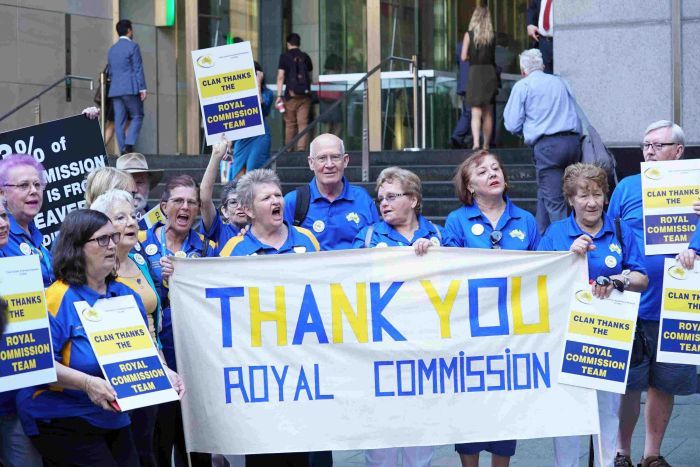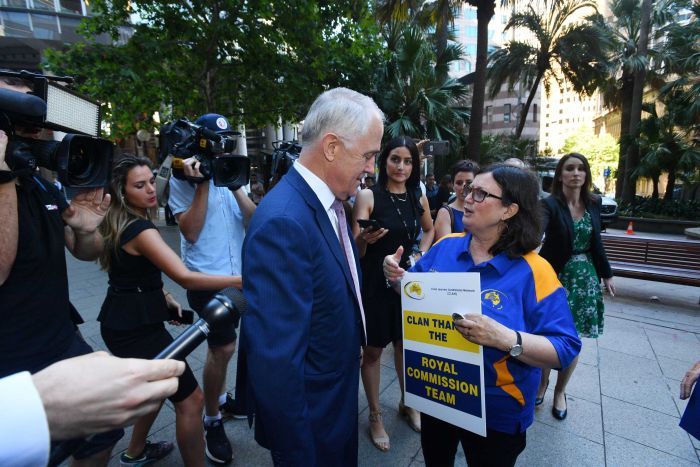A National Compensation Scheme for Abuse Victims Was Supposed to Be up and Running by Now. Why Isn't It?
By Samantha Donovan
In 2015, the Royal Commission into Institutional Responses to Child Sexual Abuse recommended a national redress scheme for victims of institutional child sexual abuse be up and running by mid-2017 "at the latest". But the $4 billion scheme is still not in place. The Federal Government has introduced a bill into Parliament, but the states and territories are reluctant to sign up to the proposed scheme. And the major institutions which will pay the compensation to survivors are waiting to see what the states do. Which leaves around 60,000 Australians anxiously waiting for their chance to apply for compensation. What's the hold-up? The Federal Government is hoping its bill will be debated in February and get bipartisan support. Applications for redress could then be made to the scheme from July 1, 2018. But the scheme will not be truly national unless the states get on board. Under the scheme, all Commonwealth institutions are automatic participants. But for state institutions to participate, the state must have "opted in" to the scheme. And non-government organisations, such as a Catholic orphanage, can only participate if the relevant state, and then their organisation, have "opted in". But there is no sign any jurisdiction will be giving its whole-hearted support any time soon. Why not? One of the major sticking points appears to be the states' roles as so-called "funders of last resort". Under the proposed scheme, the institution where the abuse occurred is to pay the compensation to survivors. But where an institution no longer exists, the Commonwealth and, more often, the states, will have to step in and foot the bill as a funder of last resort. In October, South Australia announced it was definitely not taking part. There's no doubt the states are wary of the ultimate cost to them, and they often point out the Commonwealth will be a funder of last resort less often than them. Survivor advocate Leonie Sheedy from Care Leavers' Australasia Network (CLAN) believes the states are stalling to cut their costs. "How much longer do these states want? They signed the Royal Commission patent more than five years ago," she said. "They knew it had redress in the terms of reference. They're waiting for people to die." The positions of each state and territory South Australia: It won't join the scheme but is happy to enable South Australian institutions to take part. SA claims it differs from other states because for many years it has had an ex-gratia compensation scheme for victims who were sexually abused as children in state care. And no cases against the state have had to go to trial. Victoria: It is sticking by the 'in principle' support it's had for a national redress scheme since 2015 and says it still believes that is the best outcome for survivors. But Victoria says its support for a national scheme depends on the costings and design work provided by the Commonwealth. It is working through that detail before deciding on opting-in or setting up its own a state-based scheme. New South Wales: It says it is continuing to work with the Commonwealth and other jurisdictions to develop a redress scheme that is "comprehensive, sustainable and best meets the needs of survivors". And "its primary objective remains ensuring appropriate recognition of the ongoing hurt experienced by survivors and their families". Queensland: Premier Annastacia Palaszczuk says she welcomes and supports her state's continued involvement in the development of the Federal Government's redress scheme. But Queensland is seeking more detail and assurances that the scheme will be in the best interests of Queenslanders who have suffered from child sexual abuse in Queensland institutions. The Queensland Government, for example, wants further clarification on the definitions, scope and potential costs of being a "funder of last resort". Western Australia: Premier Mark McGowan says the Federal Government has not provided adequate information to WA that would allow it to opt in. He believes the scheme has "a number of critical problems and disincentives for entities to opt in" — and those matters will be considered by Cabinet before a decision is made. Tasmania: It says it's continuing to participate in discussions with the Commonwealth and other states and territories to finalise the arrangements for the Commonwealth Redress Scheme and the technical details underpinning it. It says many of the key elements of the proposed redress scheme as it relates to Tasmania are not settled. ACT: It says it strongly supports a national redress scheme. It sees the Commonwealth Bill, as "a starting point for a nationally consistent scheme but many key details still need to be worked out". The ACT says it will "keep working with other jurisdictions and the Commonwealth to ensure that the royal commission's recommendations are implemented as broadly and consistently as possible". Northern Territory: It says it's committed to working with the Commonwealth and all other jurisdictions on the development of a proposed national redress scheme. It says, as with all jurisdictions, there could be significant budgetary implications for the Northern Territory. And there are specific technical issues that need to be considered in the context of the Northern Territory as it was administered by the Commonwealth prior to self-government starting in 1978. The NT says it will make a decision on whether to opt in to the scheme once it knows more about the scheme's design and its financial exposure. What does the Federal Government say? Federal Social Services Minister Christian Porter has had the difficult task of designing the scheme and negotiating with the states and institutions. A lawyer before entering parliament, Mr Porter said earlier this year that negotiating the scheme has been one of the hardest things he has ever had to do. "The Government is continuing to discuss the Commonwealth redress scheme with states and institutions," Mr Porter said this week. "And I remain hopeful that, in the not too distant future, we will start to see positive decisions from a number of states and institutions". But the process may now be slowed down even further, after Labor referred the bill to a Senate committee for an inquiry in November. The committee's report is due by March 13. Labor is concerned the Federal Government has rejected the Commission's recommendation of a maximum payment to survivors of $200,000, and dropped it to $150,000. Nonetheless, Federal Labor is urging all states and institutions to sign up to the redress scheme as quickly as possible.
The position of the institutions Of all the major institutions, the Catholic Church is the only one to have given the scheme its unequivocal support from the time the Commission recommended it. The Church estimates it will be required to pay out $1 billion to survivors under the scheme. "The Church leadership made it clear. Part of the way the Catholic Church atones for its history is participating in a national redress scheme," chief executive of the church's Truth Justice and Healing Council Francis Sullivan said. He is urging the states to opt in. "Under the constitution, the state governments need to transfer powers to the Commonwealth for churches and private institutions to be able to participate," he said. "Our latest advice through Minister [Christian] Porter is that there is no barrier for those states to refer the powers. Once that occurs, then the Catholic Church leadership will opt in. "We're wanting the constitutional obstacle to be removed so that the Church leadership can be true to its word … and can participate in the national redress scheme." In September, the Salvation Army reiterated its support of a single national redress scheme for victims of institutional child sexual abuse. But it is not commenting further until it sees what happens with negotiations between the Commonwealth and the states. Can the Commonwealth force the states to act? Anne Twomey, a professor of constitutional law at the University of Sydney, says where matters are contentious it can be difficult for the Commonwealth to get the states to enact the legislation needed to refer their powers to the Commonwealth. "Section 51 of the constitution allows a state to refer a 'matter' to the Commonwealth, which allows the Commonwealth to legislate about it," she said. "This can be done by referring a subject matter, for example terrorism, or by referring the substance of a bill. "That confines the Commonwealth's legislative power to enacting a law in the same form as that particular bill." Professor Twomey said it would depend "very much" on how much good will there is and whether there is inter-governmental consensus concerning the scope of the proposed legislation. "Some states, usually WA, also have an ideological aversion to referring anything to the Commonwealth," she said. "However, there is also an alternative procedure by which a state can 'adopt' the law enacted by the Commonwealth. "WA normally takes this approach instead, as it keeps the power in state hands."
|
.
Any original material on these pages is copyright © BishopAccountability.org 2004. Reproduce freely with attribution.

